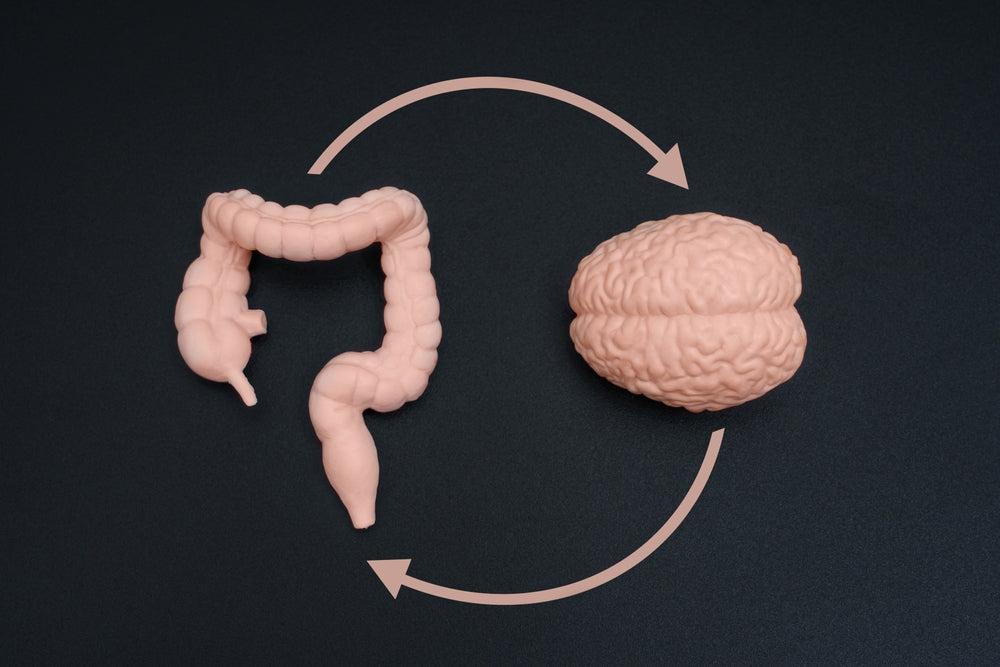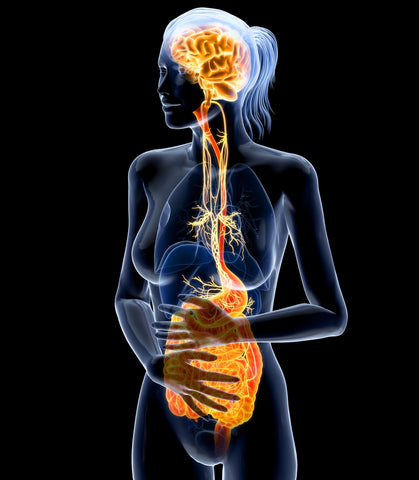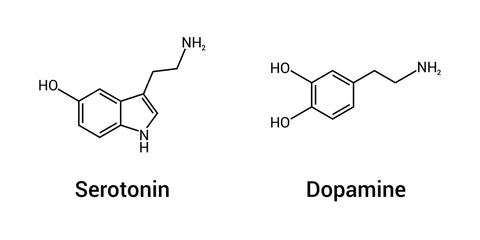Your cart is empty
Free shipping on all US orders


Free shipping on all orders

Butterflies in your stomach? That’s your brain and gut communicating with each other. Yes, via the gut-brain axis, so many things happen in the background that you just couldn’t imagine.
From your innate response to stress, to even physical issues like blood pressure, many of these originate in the gut.
Not surprisingly, it’s in your best interest to ensure that things are in tip-top shape. But before we talk about that, how about a bit more about this gut-brain axis?
The Gut-Brain Axis is a fascinating and complex communication network that connects your digestive system with your brain. This axis involves direct and indirect pathways, including various nerves, hormones, and the immune system. The main player in this communication is the vagus nerve, which acts like a superhighway, carrying messages back and forth.
When you feel hungry or full, that's the gut-brain axis at work. The gut produces signaling molecules, like serotonin, which is often called the "happiness chemical" because it influences mood.
Interestingly, about 90% of the body's serotonin is made in the digestive tract, showing how tightly linked our gut health and emotional well-being are.
But the gut-brain axis is not just about hunger and mood. It plays a role in digestion, the immune response, and even how we think and feel. Scientists are studying this connection to better understand disorders like anxiety, depression, and irritable bowel syndrome (IBS), which may be influenced by the health of our gut.
The bacteria in your gut, known as the microbiome, also play an important role. These trillions of bacteria not only help digest food but also send their own signals to the brain, affecting our mental health and cognitive functions. For example, a healthy gut microbiome can help reduce stress levels, while an imbalanced one might contribute to higher stress and anxiety.
The journey of signal transmission from the gut to the brain is both fascinating and highly complex. The vagus nerve (which, incidentally is the longest nerve in the body), among other pathways, plays a vital role in this process.

When the gut wants to "communicate" a particular state, such as hunger or fullness, it sends specific signals through these pathways. These signals can be in the form of neurotransmitters like serotonin, which not only influence mood but also appetite and digestion. This direct line of communication ensures that the brain receives timely updates on the gut's status, facilitating a coordinated response.
The role of the microbiota, the vast community of microorganisms living in our gut, is critical in the gut-brain communication network. These microorganisms do more than just aid in digestion; they produce a variety of substances that can impact brain function directly or indirectly.
This includes the production of short-chain fatty acids from fiber, which have been shown to possess anti-inflammatory properties and can influence brain health.
The microbiota can also affect the body's stress response system, influencing mood and cognitive function. This is why an imbalance in gut bacteria is sometimes associated with various mental health issues, from depression to anxiety, underscoring the importance of maintaining a healthy gut microbiota for optimal mental and physical health.
The gut microbiome is instrumental in producing neurotransmitters, like serotonin and dopamine. These chemicals are essential for regulating mood and emotions. Serotonin, often called the "feel-good" neurotransmitter, contributes to feelings of happiness and well-being.
Dopamine is linked to pleasure and reward. When the balance of these microorganisms is disturbed, the production of these neurotransmitters can be affected, leading to changes in mood and emotional state.

The gut-brain axis is involved in the body's inflammatory processes, which can influence mental health. Chronic inflammation in the gut can make the intestinal barrier more permeable, a condition sometimes referred to as "leaky gut." This allows substances that should be contained within the gut to enter the bloodstream, potentially causing inflammatory responses in other parts of the body, including the brain. This inflammation can contribute to the development of mental health disorders.
One of the most direct ways that the gut-brain axis influences physical health is through its impact on the immune system. The gut microbiome plays a crucial role in the development and function of the immune system.
A healthy, balanced gut microbiome promotes a robust immune response, whereas dysbiosis — an imbalance in gut bacteria — can lead to chronic inflammation and a weakened immune system. This, in turn, increases susceptibility to infections, autoimmune diseases, and other physical health problems.
The gut microbiome influences the body's stress response. Too, as noted previously. Stress is not only a psychological phenomenon but also has physical manifestations, including elevated blood pressure, increased heart rate, and a compromised immune system.
The gut-brain axis can modulate the body's response to stress through the production of stress hormones and neurotransmitters.
For instance, certain gut bacteria can produce gamma-aminobutyric acid (GABA), a neurotransmitter that reduces anxiety and promotes a feeling of calm. By influencing the production of such neuroactive substances, the gut microbiome can help mitigate the physical effects of stress.
Nutrient absorption is another critical aspect of physical health that is impacted by the gut-brain axis. It aids in the breakdown and absorption of nutrients, which are essential for energy production, growth, and repair of body tissues.
Certain colonies of gut bacteria can also synthesize vitamins, such as vitamin K and some B vitamins, which assist with maintaining various bodily functions. Thus, a healthy gut microbiome not only ensures optimal nutrient absorption but also contributes to the body's nutritional status, impacting overall health and well-being.
Research has even linked gut health to metabolic function, highlighting how imbalances in gut bacteria can influence the development of obesity, type 2 diabetes, and other metabolic disorders.
For example, certain gut bacteria can affect how the body metabolizes sugars and fats, influencing weight gain and insulin sensitivity. The gut-brain axis also plays a role in regulating appetite and satiety through hormones and neurotransmitters that signal hunger and fullness to the brain. An imbalance in these signals can lead to overeating or unhealthy eating habits, further exacerbating physical health problems.
In addition to these direct effects, the gut-brain axis may also influence physical health through its relationship with the cardiovascular system. Emerging evidence suggests that certain metabolites produced by opportunistic gut bacteria, such as trimethylamine N-oxide (TMAO), can contribute to the development of cardiovascular disease by promoting inflammation and atherosclerosis.
You can see why it makes sense to maintain a balanced microbiome as it can potentially reduce the risk of cardiovascular disease and many other physical ailments.
Maintaining or improving the health of the gut-brain axis doesn't come about by chance. It requires conscious effort on nutritional and lifestyle fronts to achieve. Here are some of the most effective approaches.
One of the most direct ways to influence the gut-brain dynamic is through our diet. What we eat can significantly affect the composition of our gut microbiota, which in turn can impact our mental and physical health.
A diet rich in fruits, vegetables, whole grains, and lean proteins can promote a balanced microbiota, supporting both digestive health and brain function. These foods provide the necessary nutrients and fiber to nurture beneficial bacteria and support the immune system.
Incorporating fermented foods such as yogurt, kefir, and sauerkraut into your diet can also be beneficial. These foods are rich in natural probiotic cultures, the "good" bacteria that play an essential role in maintaining gut health.
In addition to diet, certain supplements can support the gut-brain axis. Probiotic supplements, for example, can help in replenishing and maintaining the balance of good bacteria in the gut. However, it's important to choose these supplements carefully, ideally with guidance from a healthcare provider, to ensure they meet your specific needs.
Omega-3 fatty acids, found in fish oil supplements, have also been shown to benefit the gut-brain connection. These fatty acids can help reduce inflammation in the body, which is beneficial for both brain function and gut health.
Dietary fiber, often found in whole grains, vegetables, and fruits, serve as prebiotics, feeding the beneficial bacteria in the gut and helping to maintain a healthy microbiota.
Field of Greens superfood powder contains the soluble fiber inulin, also an important prebiotic food source for the very important bacteria residing in your gut.
Regular exercise is one of the most beneficial habits for overall health, and its positive effects extend to the gut-brain axis. Physical activity can help increase the diversity of gut microbiota, which is important for gut health.
Exercise promotes the growth of beneficial gut bacteria that produce short-chain fatty acids, substances known to support the integrity of the gut lining and reduce inflammation.
Sleep and your gut health are closely interlinked, with disruptions in one often leading to issues in the other. Poor sleep can negatively affect the composition of the gut microbiome, leading to increased gut permeability.
Ensuring a regular sleep pattern and good sleep hygiene practices can support the health of the gut-brain axis by maintaining a balanced gut microbiome and reducing stress and anxiety levels. We recommend the use of non-habit forming sleep aides such as Dreamzzz to help support sleep and put your circadian cycle back on track.
Chronic stress is detrimental to both gut health and brain function. It can alter the gut microbiota composition and increase gut permeability, leading to inflammatory responses that affect the brain.
Effective stress management techniques, such as mindfulness meditation, yoga, and deep breathing exercises can help reduce the impact of stress on the gut-brain axis. These practices not only lower stress levels but also have been shown to have a positive effect on gut microbiota diversity.
Excessive alcohol consumption and smoking are known to adversely affect gut health. Alcohol can damage the gut lining, and pave the way for leaky gut as well. Similarly, smoking disrupts the balance of the gut microbiome and is associated with an increased risk of gut inflammation and disorders. Limiting alcohol intake and quitting smoking can thus handsomely benefit the gut-brain axis.
Do you like spending time in the great outdoors? Turns out the microbiome does too!
Spending time in natural environments, such as parks, forests, and beaches, can have a surprisingly positive effect on gut and brain health.

This practice, often referred to as "forest bathing" or "eco-therapy," has been shown to reduce stress, improve mood, and even affect the composition of the gut microbiota in a positive way. Regular exposure to diverse natural microbes in the environment can help boost the immune system and reduce inflammation, supporting the health of the gut-brain axis.
Human beings are inherently social creatures, and our relationships with others can have a profound impact on our health. Strong social connections are associated with lower levels of stress and anxiety, which in turn benefits the gut-brain axis.
Engaging in positive social activities can boost feelings of happiness and well-being, reducing the risk of mental health issues. Positive social interactions can also help influence lifestyle choices that support gut health, such as engaging in physical activity and reducing the consumption of alcohol.
While these tips can significantly contribute to a balanced gut-brain axis, it's important to recognize that sometimes professional advice is needed. If you experience persistent digestive issues or significant changes in mood, or if you're considering starting new supplements, consulting with a healthcare provider is a wise step.
They can offer personalized advice and guide you toward the most effective strategies for maintaining a healthy gut-brain connection.
Holistic health is the way to go as opposed to slapping a band-aid on a condition and hoping for the best, especially since empirical therapy seems to always include some sort of antibiotic therapy and antidepressant.
The impact of the GBA on your entire health is unquestionable and profound. There are so many far-reaching effects, yet people scarcely see the relationship between the gut and the brain.
Don’t neglect the gut- it can make or break you, both physically and mentally.